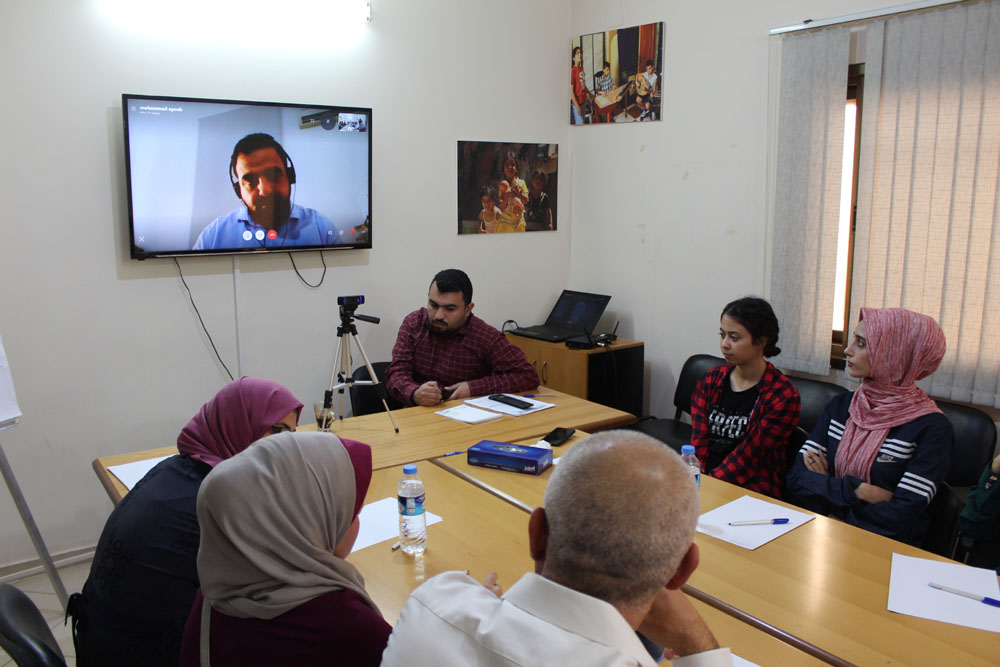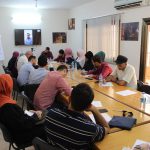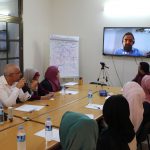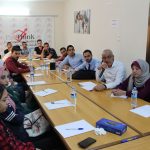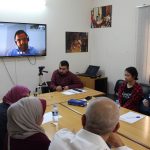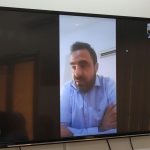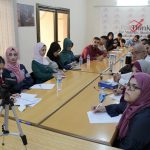Pal-Think for Strategic Studies organized a skype meeting with Mr. Mohammad Ayoub, Founder and Director of Nahnoo, a Lebanese youth organization based in Beirut. The session is one of the Youth Political Club activities, funded by the National Endowment for Democracy (NED). Mr. Omar Shaban welcomed the guest and complimented on the close ties between the Palestinian and Lebanese peoples, stressing the importance of communication and collaboration with similar Arab experiences that can be adopted in the Palestinian context. The session is one among a series of sessions with a number of organizations in the Arab region and around the world.
Mr. Ayoub talked to the YPC’s members about the experience of “Nahnoo” in planning and implementing initiatives that address the need of their community. He shed light on the “Horsh Beirut” campaign which aimed to create a public space in the midst of a rapid urbanization movement in Beirut. This public space is aimed to serve as a meeting point of people from different religions, sects, and ethnicities, instead of previously being a barrier between them. Ayoub and his colleagues started conducting legal, political, environmental, and social studies about the “Horsh,” emphasizing the role of research before any planning or implementation of community activities.
He also listed the benefits of opening a green open space in the middle of Beirut, such as founding a forum where all Lebanese people can spend leisure time and meet with people from different social backgrounds. He used an analogy of a house’s living room “Horsh Beirut,” where differences fade in the big mix, referring to when people gather in the Horsh. Then they would separate again in their own bedrooms with their differences. Adding that this analogy serves to reinforce the symbolic importance for public spaces which can host community events and national celebrations as well as other peaceful gatherings.
Narrating the development of the campaign stages, Ayoub talked about the partial opening of the Horsh, and the increase of popular pressures resulting in a grand opening for all the people of Beirut, and up to the current stage where a contest was announced for all designers, researchers, and engineers to compete on a suitable urban plan for the Horsh. Which aims to involve everyone in the decision-making process, and spreading awareness about the Horsh urging its maintenance and management as a valuable public property.
Ayoub also discussed means and strategies used throughout the campaign which started in 2010. Listing research papers, field visits, awareness tours, peaceful protests, cooperation with stakeholder security forces, team capacity building, legal documentation, and press releases which are all necessary to achieve their set goal.
The session was concluded with a round of Q&A, as club members engaged with the guest. One of the questions was “Whether the role of the civil society was complementary or alternative to the role of a government?” Ayoub answered that we needed to define the civil society, which is basically all that is not military. “The increase in numbers of civil society organizations is of correlation with and a result of poor governmental performance”, he added. “And that the role of such organizations can be complementary to governmental efforts, alternative to them, or opposing to practices of that government, which solely depends on the specific organization in question, apart from generalizations”.

